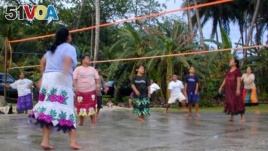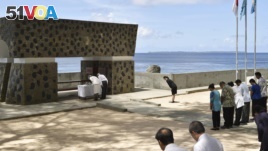01 April, 2017
Three sovereign, self-governing Pacific island nations are joined with the United States in Compacts of Free Association.
The three are the Federated States of Micronesia (FSM), the Republic of the Marshall Islands (RMI) and Palau. They are sometimes called the Freely Associated States (FAS).
Many Americans know very little about these island nations or that they have a relationship with the United States. But American officials consider the countries important because of their location in the Pacific. The People's Republic of China and other nations have begun investing in the three countries in an attempt to increase their influence in the area.
The three island nations receive millions of dollars in direct aid from the U.S. government. In 2016, they received more than $214 million to help their governments and economies. They also get help from U.S. government agencies such as the Federal Emergency Management Agency, the National Weather Service and the U.S. Postal Service.
The Compacts of Free Association are bilateral, international agreements. They permit certain citizens of FSM, RMI and Palau to visit -- and live in -- all 50 states and all U.S. territories as legal nonimmigrants without a visa. They can live, work and study in the states and territories for an indefinite period of time. American citizens have what are called "reciprocal rights" -- they may live and work in the three island nations.
The Compacts also permit the United States to place troops in the three countries, and give the U.S. the right to use some of their land for bases. The countries agree not to permit the militaries of other nations to operate in their territory.
Micronesians, Marshallese and Palauans all use the U.S. dollar as their national currency -- in other words, they use the dollar when making purchases in their home country.

FILE - Women play volleyball April 9, 2004, in Kosrae, Micronesia. (AP Photo/Charles Hanley)
Micronesia
The Federated States of Micronesia adopted a constitution in 1979. The Compact of Free Association with the United States took effect in 1986, three years after its citizens voted to approve it. The FSM was admitted as a member of the United Nations in 1991.
About 108,000 people live in the Federated States of Micronesia.
The nation has about 607 islands. It is in the Western Pacific, about 2,500 miles southwest of Hawaii.
In 2003, a new, 20-year agreement on U.S. financial assistance was reached. It included a new Compact between the FSM and the U.S.
Like the agreements with the Marshall Islands and Palau, the Compact "provides financial assistance, defends FSM's territorial integrity and provides for visa-free travel for citizens to the United States. The United States has special access to FSM's land and waterways for strategic purposes."
Marshall Islands
The Government of the Republic of the Marshall Islands was established in 1979. The country joined the United Nations in 1991. The Compact of Free Association took effect in 1986. Like FSM, in 2003 it reached a new, 20-year agreement on financial assistance with the United States that included an Amended Compact.
The U.S. Army's Kwajalein Atoll Reagan Missile Test Site is in the Marshall Islands. It is an important part of America's anti-missile defense system. The U.S. Department of Defense pays the Marshall Islands to use the atoll and to control some of the islands in the Kwajalein Atoll.
From 1946 to 1958, the United States Department of Defense operated nuclear testing programs at Bikini and Enewetak Atolls. The U.S. State Department told VOA that "the United States (has) recognized the effects of (the) testing and has accepted and acted on its responsibility to the people of the Marshall Islands." As part of the 1986 Compact with the Marshall Islands, the U.S. government settled claims with the country and has paid more than $600 million to affected communities, including $135 million to resettle people who lived on the atolls.
About 63,000 people live in the Marshall Islands, which has five large islands and 29 small coral atolls.
As part of the Amended Compact, the United States agreed to provide financial help to FSM and the Marshall Islands until 2023 in the form of "direct sector grant assistance" and trust fund contributions. But U.S. officials do not want to continue giving those nations money forever. So the U.S. government is providing money to create a program that will help them become self-sufficient after direct aid ends.

FILE - Emperor Akihito, top right, and Empress Michiko, top left, offer flowers in front of a memorial for Japanese victims on Pelelilu island in Palau April 9, 2015.
Palau
Palau also adopted a constitution in 1979. Its Compact of Free Association with the United States took effect in 1994. The U.S. Department of the Interior says the Compact "defends Palau's territorial integrity, and (permits) visa-free travel by Palauan citizens to the United States. The United States has special access to Palau's land and waterways for strategic purposes."
Although the U.S. government and Palau decided in 2010 to augment the Compact, the U.S. Congress has not agreed to fund and approve it. However, even though the new agreement has not taken effect, most parts of the 1994 Compact remain in effect.
In 1994, Palau ceased being the last district of the Trust Territory of the Pacific Islands and was admitted as a member of the United Nations.
It is estimated that between 14,000 and 18,000 people live in Palau, which has about 250 islands. Palau is in the Pacific Ocean, about 7,600 kilometers west of Hawaii.
In World War II, during the Battle of Peleliu, a state in Palau, more than 1,500 U.S. servicemen died and at least 8,000 were wounded. The fighting took place in late 1944, and lasted for two and one half months. It was one of the bloodiest battles of the war.
The U.S. Department of the Interior has provided Palau with more than $13 million in aid every year since 2010.
Grace Choi is a spokesperson for the U.S. State Department's East Asian and Pacific Affairs Bureau. She said that if Congress had approved the 2010 agreement, Palau would have received "$229 million in financial assistance in several categories through fiscal year 2024, including an additional $30 million for its Trust Fund."
Palauans serve in the U.S. military at much higher rates compared to the size of their population than any American state. However, the U.S. territory of American Samoa has the highest rate of enlistment of any state or territory, however. And Palau supports the United States in votes at the United Nations between 87 and 97 percent of the time, more than almost any other country.
In 2011, the State Department told Congress that "our relationship with not only Palau but with other FAS states (permits) the United States to guard its long-term defense and strategic interest in the region."
Palau, the department said, "helps create a security zone that safeguards U.S. interests in the Pacific." It warned that China, Arab states and Cuba are "actively courting Palau and the other Pacific island nations as they seek to build influence in the region."
The U.S. Census Bureau estimates that more than 41,000 citizens from FSM, RMI and Palau live in the United States. The five states with the highest number of citizens from those three countries are Hawaii, Arkansas, Washington, Oregon, and Texas. The Census Bureau estimates that almost 20,000 citizens of the three nations live in the U.S. territories of Guam and the Northern Mariana Islands.
I'm Jonathan Evans.
And I'm Caty Weaver.
John Smith reported this story for Learning English. George Grow was the editor.
We want to hear from you. Write to us in the Comments Section, or visit our 51VOA.COM.
________________________________________________________________
Words in this Story
sovereign – adj. having independent authority and the right to govern itself
location – n. a place or position
bilateral – adj. involving two groups or countries
indefinite – adj. not certain in amount or length
reciprocal – adj. used to describe a relationship in which two people or groups agree to do something similar for each other, to allow each other to have the same rights, etc.
currency – n. the money that a country uses; a specific kind of money
adopt – v. to accept or approve (something, such as a proposal) in a formal or official way
access – n. a way of being able to use or get something (usually + to)
amend – v. to change some of the words and often the meaning of (a law, document, etc.)
atoll – n. an island that is made of coral and shaped like a ring
self-sufficient – adj. able to live or function without help or support from others
augment – v. to add something to (something) in order to improve or complete it
court – v. to give a lot of attention and praise to (someone) in order to get approval, support, etc.
region – n. a part of a country, of the world, etc., that is different or separate from other parts in some way